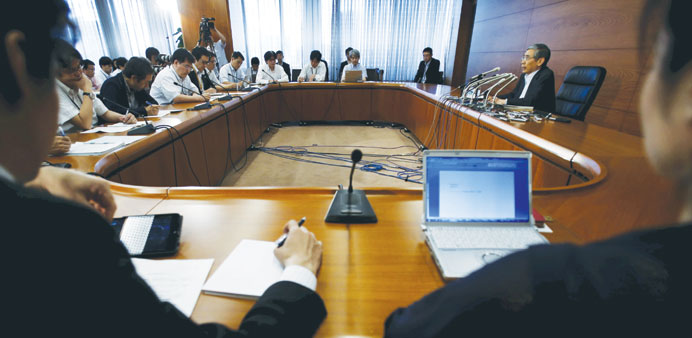Bank of Japan governor Haruhiko Kuroda attends a news conference at the BoJ headquarters in Tokyo. The BoJ trimmed its economic growth forecast yesterday but held off on offering fresh stimulus, convinced that an expected pick-up in consumption will help accelerate inflation toward its 2% target.
AFP/Tokyo
Japan’s central bank yesterday cut its economic growth and inflation forecasts, as analysts warned over a disappointing second quarter that underscores the wobbly success of Tokyo’s Abenomics growth project.
Bank of Japan (BoJ) chief Haruhiko Kuroda, however, insisted that any downturn would be short-lived and that policymakers still expect to hit their inflation target by next year, a cornerstone of efforts to bolster the world’s number three economy.
After a two-day policy meeting, the BoJ said the economy would expand 1.7% in the fiscal year to March 2016 while inflation would come in at 0.7%. That was down from 2% and 0.8%, respectively, estimated earlier this year.
While the bank kept up its view that Japan’s economy was recovering “moderately”, it acknowledged that a pick-up in exports and industrial production had seen “some fluctuations”.
Hideo Kumano, senior economist at Dai-ichi Life Research Institute, said trimming the growth forecasts “probably means growth in the April-June quarter was not very good”. Official second quarter GDP data are due next month.
BoJ policymakers have been scaling back their expectations and governor Haruhiko Kuroda has conceded that an ambitious 2% inflation target was still some way off.
But he told reporters after the meeting yesterday that the BoJ was still on track to hit the price target by next year, and that the weakness in exports was due to a still-recovering US economy.
Growth would turn around by the third quarter, Kuroda said.
“Prices will likely pick up at a significant pace some time during the end of this fiscal year” to March 2016, he said.
Japan’s economy expanded 1% in January-March after limping out of recession in the last three months of 2014, and business confidence remains strong. But consumer spending has struggled after a sales tax rise last year and economists widely expect the BoJ to ramp up its easing programme, likely later this year, to bring Japan closer to its inflation target. Yesterday, the BoJ stood pat on its record asset-purchase programme, which is pumping about ¥80tn ($648bn) into the financial system annually in a bid to jack up prices and kickstart growth.
“The Bank’s view on the economy remains too optimistic. Economic activity weakened sharply in the second quarter, and business surveys suggest that output will not rebound rapidly in coming months,” Marcel Thieliant from Capital Economics said in a commentary.
“Price pressures are unlikely to strengthen as quickly as policymakers hope.”
While a weak yen has boosted the bottom line for many Japanese exporters, Tokyo’s bid to resuscitate the economy has struggled as it tries to rid Japanese consumers of the idea that prices will not rise much.
Deflation may sound good for shoppers, but it means people tend to put off buying because they do not expect prices to rise and hope they might even get goods cheaper down the line.
That, in turn, hurts producers and holds back their expansion and hiring plans, which is bad news for the economy, a problem that has weighed on growth for years. The BoJ’s easing plan, launched more than two years ago, is aimed at changing consumers’ so-called deflationary mindset by forcing prices upward. But still-tepid inflation puts the BoJ in a tricky position as it has already pushed back its two-year timeline for hitting its price target and more delays could dent the credibility of its easing measures, Thieliant said.
“We think that policymakers will instead opt for an expansion of monetary stimulus, perhaps as early as late October,” he added.

